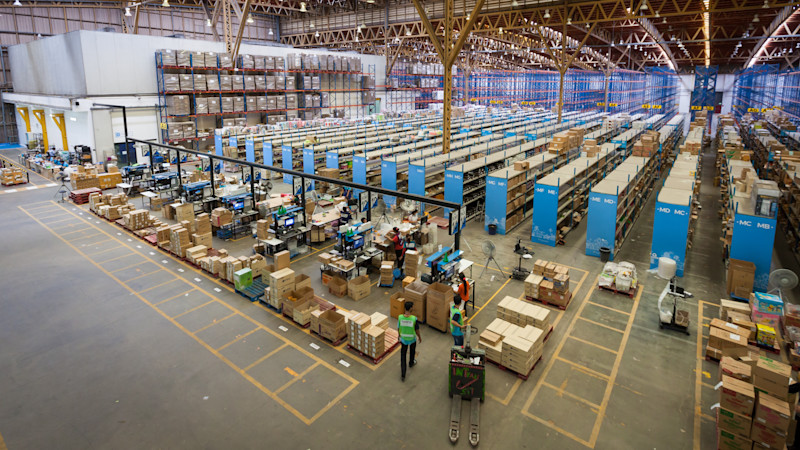- Iterate
- Meet The Team
- Meet the Five Companies Behind Thailand’s E-Commerce Boom
Meet the Five Companies Behind Thailand’s E-Commerce Boom
Table of contents
Over the last several years, high internet penetration rate (75% of the country’s 70 million citizens in 2020, up from 20% in 2018), the introduction of 5G, and a growing middle class have led to an e-commerce boom in the country. Thailand’s e-commerce industry grew 35% in 2019, from $5.2 billion to $7.1 billion in 2020, and now takes the second place globally in e-commerce adoption.

Lazada Thailand
With a presence in Thailand as well as six other countries in the region, Lazada is no doubt the trailblazer in the region. Founded in 2012 by Rocket Internet, and acquired by Alibaba in 2016 for $4 billion, Lazada consolidates 18,000 international and local brands and brings them onto its marketplace – making it easily the largest e-commerce store in Thailand with the most number of sellers. Because Lazada is able to leverage Alibaba’s extensive e-commerce logistics and technology, it offers next-day-delivery in Thailand and 7-day delivery cross-border in the region.
In an interview with the Bangkok Post, Paradee Sinthawanarong, CMO of Lazada Thailand, shared that during the Covid-19 lockdown in the country, new sellers on the platform grew by 75%, while millions of new shoppers joined and spent 30% more time than average on the platform.
Lazada has raised over $4.2 billion dollars and sees over 44 million monthly customers in Thailand.
Shopee Thailand
Another regional player, Shopee is primarily a mobile-first online store that also provides a regular web shopping platform. Headquartered in Singapore, Shopee also has operations across Thailand,, Vietnam, Malaysia, Indonesia, and the Philippines. Shopee was first launched exclusively as a C2C (consumer-to-consumer) platform that now has both C2C and B2C offerings. In 2017, Shopee’s parent company, Sea, filed for an IPO on the NYSE for $2 billion.
Now, there are over 100,000 online stores selling over 10 million products on Shoppe, while over 95% of transactions on the platform are made on smartphones. And in Thailand alone, the platform sees 30 million monthly visits. With intense competition from Lazada and Amazon in the region, Shopee differentiates itself through its own escrow service, “Shopee Guarantee,” where it withholds payment to sellers until buyers have received their orders.
In the past five years since Shopee began its operations in Thailand, the platform has been downloaded over 40 million times, sells over 3000 local brands, and has 800 employees.
aCommerce
Founded in 2013 by Paul Srivorakul and Peter Kopitz, this Bangkok-headquartered company was launched with the mission to “make e-commerce easy” and is a one-stop-shop for logistics and management. aCommerce is an e-commerce enabler that provides end-to-end technologies and solutions such as performance marketing, channel management, order fulfillment and warehousing, delivery, and even content and design.
aCommerce has collaborated with over 200 brands, including big ticket names like Unilever, Uniqlo, and Adidas, to enable global companies to go online in the country and across Southeast Asia. Since 2017, aCommerce has seen an annual growth rate of nearly 200% and employs 1,100 people across the region.
The company has raised over $118 million since its launch, mostly recently a $15 million Series D round led by Indies Capital Partners.

Power Buy
The next major player in Thailand is a 25 year old electronics chain that went online to cater to the shift to the internet economy. A subsidiary of the family-owned conglomerate, Central Group, Power Buy started out in 1996 as a chain of brick-and-mortar stores in Thailand specializing in electronics and household appliances.
Over time, it built 90 such stores across the country but eventually entered e-commerce in 2015 to adapt to the growing online demand. In order to ramp up its online presence and save investment costs, the company gradually started reducing physical store space from an average of 4,000 square meters to 300-400 square meters. In the first two years of this transition, online sales were 2% of Power Buy’s total sales. By 2019, that was up to 5%. Power Buy has been able to seamlessly integrate its offline experience with online with features such as ‘Click&Collect’, ‘1 hour pick-up’, and ‘Chat and Shop’.
Today, Power Buy’s online store consolidates over 200 brands, and 20,000 products, and sees over 2.5 million monthly site visits.
Pomelo
Launched in 2013 in Bangkok by the former Managing Director of Lazada Thailand, David Jou, Pomelo is an online women’s fashion store offering everything from beachwear to sportswear. What sets Pomelo apart from other fashion e-commerce stores is its innovative network of 50 “fitting rooms.” Pomelo partners with gyms, cafes, co-working spaces, and malls to set up these fitting rooms that allow customers to pick up and try on their online orders. Customers can then reorder their clothes if the fitting isn’t right or only pay for what they take home.
In addition to its webstore and 20 brick-and-mortar stores across the region, the bulk of which are in Thailand, 85% of the sales are processed through its mobile app. Pomelo sees over 4 million monthly visits, 60 million in social media reach and has retailed to customers in over 50 countries. The company has raised $83 million to date.

Today, Thailand’s retail landscape is evidently led by Lazada and Shopee, which collectively own 80-90% of the country’s online market share. However, the entry of these two giants has catalyzed the development of infrastructure and demand for e-commerce in the country; further fueled by tech platforms like aCommerce. Increase in online spending by 25% in 2019 and the rise of more homegrown platforms will usher Thailand into an era of agile commerce and digital entrepreneurship.
--
The Org is a professional community where transparent companies can show off their team to the world. Join your company here to add yourself to the org chart!

